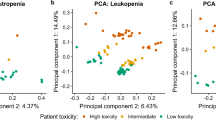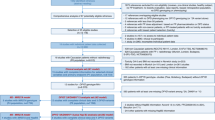Abstract
Gefitinib is a widely used targeted therapeutic drug in East Asian non-small cell lung cancer (NSCLC) patients. This research retrospectively investigated the relationship between the polymorphisms of genes involved in NF-κB pathways and gefitinib-related Adverse Drug Reactions (ADRs). From 2011 to 2016, 109 NSCLC patients were enrolled in this study. Thirty-two SNPs of 15 genes were genotyped with a Sequenom MassARRAY system. We collected 34 paired RNA samples before and after gefitinib administration for the detection of whole blood RNA expression of genes in NF-κB pathways (NFKBIA, NFKB1, NFKB2, RELA, RELB, and TNFAIP3). IKBKB rs2272733 (CC vs non-CC: OR = 0.256, 95% CI 0.087–0.753, P = 0.013) and IKBKE rs12142086 (CC vs non-CC: OR = 3.640, 95% CI 1.320–10.039, P = 0.013) were significantly associated with gefitinib-induced skin toxicity. IKBKE rs2151222 was associated with diarrhea with the odds ratio of non-TT vs TT as 0.162 (non-TT vs TT: 95% CI 0.034–0.775, P = 0.023). Furthermore, RELA rs11227247 was a predictor for hepatic toxicity (GG vs non-GG: OR = 0.212, 95% CI 0.062–0.726, P = 0.013). None of the gene expression levels after drug administration were determined to be significant predictors for adverse drug reactions by a logistics regression analysis. Polymorphisms of IKBKB, IKBKE, and RELA are potential biomarkers for predicting gefitinib-related ADRs. Further studies are needed to understand the underlying mechanisms for diagnostic and prophylactic therapy applications.
This is a preview of subscription content, access via your institution
Access options
Subscribe to this journal
Receive 6 print issues and online access
$259.00 per year
only $43.17 per issue
Buy this article
- Purchase on Springer Link
- Instant access to full article PDF
Prices may be subject to local taxes which are calculated during checkout
Similar content being viewed by others
Data availability
The datasets generated and/or analyzed during the current study are not publicly available due China Human Genetic Resources Regulations but are available from the corresponding author on reasonable request. All statistical analyses were performed using R (version 3.2.4). The computer codes are available from the corresponding author by e-mail on reasonable request.
References
Chen W, Zheng R, Baade PD, Zhang S, Zeng H, Bray F, et al. Cancer statistics in China, 2015. CA: A Cancer J Clin. 2016;66:115–32.
Xin S, Zhao Y, Wang X, Huang Y, Zhang J, Guo Y, et al. The dissociation of gefitinib trough concentration and clinical outcome in NSCLC patients with EGFR sensitive mutations. Sci Rep. 2015;5:12675.
Choi YJ, Lee DH, Choi CM, Lee JS, Lee SJ, Ahn JH, et al. Randomized phase II study of paclitaxel/carboplatin intercalated with gefitinib compared to paclitaxel/carboplatin alone for chemotherapy-naive non-small cell lung cancer in a clinically selected population excluding patients with non-smoking adenocarcinoma or mutated EGFR. BMC Cancer. 2015;15:763.
Maemondo M, Inoue A, Kobayashi K, Sugawara S, Oizumi S, Isobe H, et al. Gefitinib or chemotherapy for non-small-cell lung cancer with mutated EGFR. New Engl J Med. 2010;362:2380–8.
Zhang L, Ma S, Song X, Han B, Cheng Y, Huang C, et al. Gefitinib versus placebo as maintenance therapy in patients with locally advanced or metastatic non-small-cell lung cancer (INFORM; C-TONG 0804): a multicentre, double-blind randomised phase 3 trial. Lancet Oncol. 2012;13:466–75.
Mok TS, Wu YL, Thongprasert S, Yang CH, Chu DT, Saijo N, et al. Gefitinib or carboplatin-paclitaxel in pulmonary adenocarcinoma. New Engl J Med. 2009;361:947–57.
Guttman-Yassky E, Mita A, De Jonge M, Matthews L, McCarthy S, Iwata KK, et al. Characterisation of the cutaneous pathology in non-small cell lung cancer (NSCLC) patients treated with the EGFR tyrosine kinase inhibitor erlotinib. Eur J Cancer. 2010;46:2010–9.
Gazel A, Blumenberg M. Transcriptional effects of inhibiting epidermal growth factor receptor in keratinocytes. Dermatol Sin. 2013;31:107–19.
Woodworth CD, Michael E, Marker D, Allen S, Smith L, Nees M. Inhibition of the epidermal growth factor receptor increases expression of genes that stimulate inflammation, apoptosis, and cell attachment. Mol Cancer Ther. 2005;4:650–8.
Hayden MS, Ghosh S. Signaling to NF-kappaB. Genes Dev. 2004;18:2195–224.
Rebholz B, Haase I, Eckelt B, Paxian S, Flaig MJ, Ghoreschi K, et al. Crosstalk between keratinocytes and adaptive immune cells in an IkappaBalpha protein-mediated inflammatory disease of the skin. Immunity. 2007;27:296–307.
Lulli D, Carbone ML, Pastore S. Epidermal growth factor receptor inhibitors trigger a type I interferon response in human skin. Oncotarget. 2016;7:47777–93.
Takeda M, Nakagawa K. Toxicity profile of epidermal growth factor receptor tyrosine kinase inhibitors in patients with epidermal growth factor receptor gene mutation-positive lung cancer. Mol Clin Oncol. 2017;6:3–6.
Wang J, Wu Y, Dong M, He X, Wang Z, Li J, et al. Observation of hepatotoxicity during long-term gefitinib administration in patients with non-small-cell lung cancer. Anti-Cancer Drugs. 2016;27:245–50.
Kobayashi H, Sato K, Niioka T, Takeda M, Okuda Y, Asano M, et al. Effects of polymorphisms in CYP2D6 and ABC transporters and side effects induced by gefitinib on the pharmacokinetics of the gefitinib metabolite, O-desmethyl gefitinib. Med Oncol. 2016;33:57.
Takimoto T, Kijima T, Otani Y, Nonen S, Namba Y, Mori M, et al. Polymorphisms of CYP2D6 gene and gefitinib-induced hepatotoxicity. Clin Lung Cancer. 2013;14:502–7.
Ma Y, Xin S, Huang M, Yang Y, Zhu C, Zhao H, et al. Determinants of Gefitinib toxicity in advanced non-small cell lung cancer (NSCLC): a pharmacogenomic study of metabolic enzymes and transporters. Pharmacogen J. 2017;17:325–30.
Barton-Burke M, Ciccolini K, Mekas M, Burke S. Dermatologic reactions to targeted therapy: a focus on epidermal growth factor receptor inhibitors and nursing care. Nurs Clin North Am. 2017;52:83–113.
Clabbers JMK, Boers-Doets CB, Gelderblom H, Stijnen T, Lacouture ME, van der Hoeven KJM, et al. Xerosis and pruritus as major EGFRI-associated adverse events. Supportive Care Cancer. 2016;24:513–21.
Macdonald JB, Macdonald B, Golitz LE, LoRusso P, Sekulic A. Cutaneous adverse effects of targeted therapies: Part I: Inhibitors of the cellular membrane. J Am Acad Dermatol. 2015;72:203–18. quiz 219–20.
Abu-Humaidan AH, Ananthoju N, Mohanty T, Sonesson A, Alberius P, Schmidtchen A, et al. The epidermal growth factor receptor is a regulator of epidermal complement component expression and complement activation. J Immunol. 2014;192:3355–64.
Lichtenberger BM, Gerber PA, Holcmann M, Buhren BA, Amberg N, Smolle V, et al. Epidermal EGFR controls cutaneous host defense and prevents inflammation. Sci Transl Med. 2013;5:199ra111.
Mascia F, Lam G, Keith C, Garber C, Steinberg SM, Kohn E, et al. Genetic ablation of epidermal EGFR reveals the dynamic origin of adverse effects of anti-EGFR therapy. Sci Transl Med. 2013;5:199ra110.
Paul T, Schumann C, Rudiger S, Boeck S, Heinemann V, Kachele V, et al. Cytokine regulation by epidermal growth factor receptor inhibitors and epidermal growth factor receptor inhibitor associated skin toxicity in cancer patients. Eur J Cancer. 2014;50:1855–63.
Bakker E. Is the DNA sequence the gold standard in genetic testing? Quality of molecular genetic tests assessed. Clin Chem. 2006;52:557–8.
Ramakodi MP, Devarajan K, Blackman E, Gibbs D, Luce D, Deloumeaux J, et al. Integrative genomic analysis identifies ancestry-related expression quantitative trait loci on DNA polymerase beta and supports the association of genetic ancestry with survival disparities in head and neck squamous cell carcinoma. Cancer. 2017;123:849–60.
Wang C, Ahlford A, Laxman N, Nordmark G, Eloranta ML, Gunnarsson I, et al. Contribution of IKBKE and IFIH1 gene variants to SLE susceptibility. Genes Immun. 2013;14:217–22.
Sandling JK, Garnier S, Sigurdsson S, Wang C, Nordmark G, Gunnarsson I, et al. A candidate gene study of the type I interferon pathway implicates IKBKE and IL8 as risk loci for SLE. Eur J Hum Genet. 2011;19:479–84.
Dieguez-Gonzalez R, Akar S, Calaza M, Perez-Pampin E, Costas J, Torres M, et al. Genetic variation in the nuclear factor kappaB pathway in relation to susceptibility to rheumatoid arthritis. Ann Rheum Dis. 2009;68:579–83.
Zhang S, Yang N, Ni S, Li W, Xu L, Dong P, et al. Pretreatment of lipopolysaccharide (LPS) ameliorates D-GalN/LPS induced acute liver failure through TLR4 signaling pathway. Int J Clin Exp Pathol. 2014;7:6626–34.
Melosky B, Anderson H, Burkes RL, Chu Q, Hao D, Ho V, et al. Pan canadian rash trial: a randomized phase III trial evaluating the impact of a prophylactic skin treatment regimen on epidermal growth factor receptor-tyrosine kinase inhibitor-induced skin toxicities in patients with metastatic lung cancer. J Clin Oncol. 2016;34:810–5.
Lacouture ME, Anadkat MJ, Bensadoun RJ, Bryce J, Chan A, Epstein JB, et al. Clinical practice guidelines for the prevention and treatment of EGFR inhibitor-associated dermatologic toxicities. Supportive Care Cancer. 2011;19:1079–95.
Acknowledgements
This work was supported by the National Nature Science Foundation of China [nos. 81973398 and 81473283]; and the National Key R&D Program of China [2016YFC0905003, 2016YFC0905503, 2017YFC0909303]; and Science and Technology Program of Guangdong Province [2017B020227001, 201607020031]; and the 111 Project, no. B16047; and Science, Technology and Innovation Commission of Shenzhen Municipality under grant no. JCYJ20170817145454378; and Open Fund for South China State Key Laboratory of Oncology [HN2017-06].
Author information
Authors and Affiliations
Contributions
XDW, LZ, XX, and MH, conceived and planned the experiments. SX, and WZ carried out the experiments. YYZ, YH, and YXM contributed to sample preparation and clinical data collection. CZW carried out the data analysis. SX and YYZ. took the lead in writing the paper and the results. All authors provided critical feedback and helped shape the research, analysis, andpaper.
Corresponding authors
Ethics declarations
Conflict of interest
The authors declare that they have no conflict of interest.
Ethical approval
The study was approved by the Ethical Committee of Sun Yat-Sen University Cancer Center (B2013-08-01).
Informed consent
Written informed consent was obtained from all participating subjects. This trial was registered at ClinicalTrials.gov. (NCT01994057).
Additional information
Publisher’s note Springer Nature remains neutral with regard to jurisdictional claims in published maps and institutional affiliations.
Rights and permissions
About this article
Cite this article
Xin, S., Zhao, Y., Wang, C. et al. Polymorphisms of NF-κB pathway genes influence adverse drug reactions of gefitinib in NSCLC patients. Pharmacogenomics J 20, 285–293 (2020). https://doi.org/10.1038/s41397-019-0115-z
Received:
Revised:
Accepted:
Published:
Issue Date:
DOI: https://doi.org/10.1038/s41397-019-0115-z



